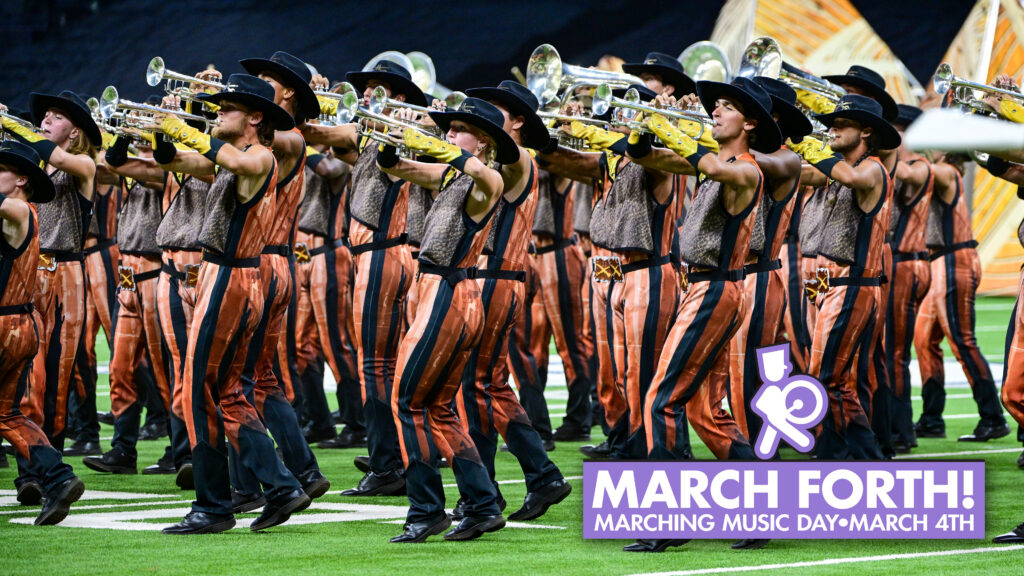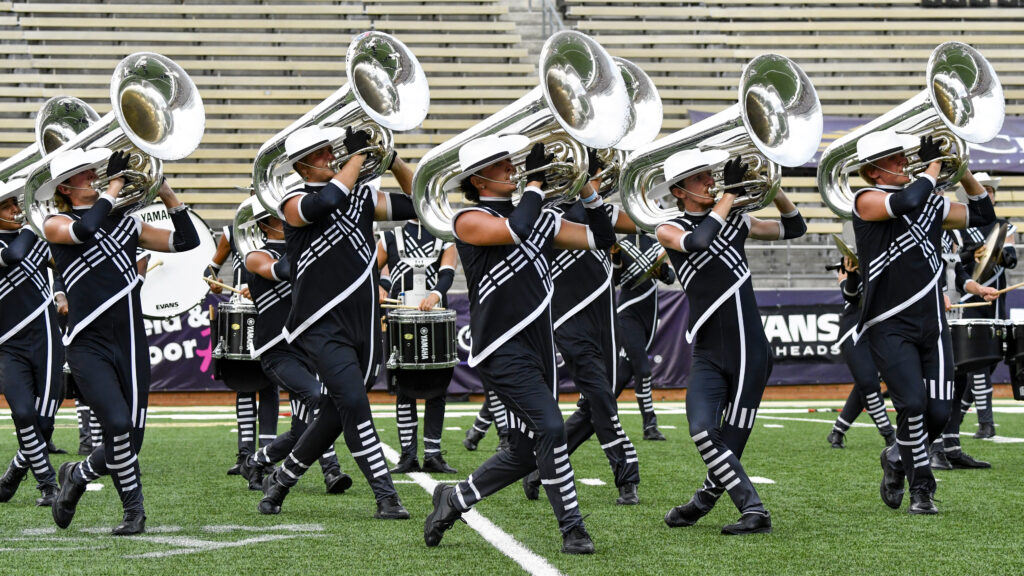Each year I end up with some submissions I’m not quite sure what to do with. It’s not that they aren’t worthy, for they are. But they are usually shorter in length than a typical column and I have difficulty finding something to pair them with. And that, friends, is the purpose of “Loose Ends,” a year-end celebration of all that is good that just doesn’t conveniently fit in a certain pre-conceived writer’s cubbyhole.
New drum corps book. Jud Spena has published a new book of interest to anyone who remembers drum corps in upstate New York. “Echoes in the Valley” is the history of the Watkins Glen Squires and their predecessors in Schuyler County, chronicling the activity from the early 1930s through the 1970s. Highlights include memories of the first hometown parade, the war bond rallies during the early 1940s, the V-J Day Celebration in 1945, winning the New York State Championship and almost sneaking into DCI World Finals in 1975 with a 13th-place finish. Most importantly, perhaps, the book deals with how a small community proudly supported its youth in the corps activity, a roadmap for how other communities could do the same. For information on how to order this 228-page book (with 265 pictures), please contact Jud Spena directly at [email protected]. Include the word “Echoes” in the subject line.
Quite a block to live on Those who have been around DCI since it’s formative years will remember the name of Colin Klos, who was the drill writer for Blue Stars for a few seasons in the late 1970s. He remembers a very special block of members in LaCrosse, Wis. “I spent 17 years in the Blue Stars; I marched in parades in 1965 and aged out in 1971and taught M&M from 1972-1981.There were seven kids that lived on Redfield Street between Losey Blvd. and 24th Street. They were Dave Mandehr (soprano, mellophone), Debbie Mandehr (rifle), Karl Kelly (French horn, mellophone), Karen Kelly (flag), Lee Foley (soprano), Peter Foley (soprano, mellophone) and Tim Padesky (French horn). They were some of my best friends and I spent many a day and night on Redfield Street. That was drum corps at its finest.” Boo PS: If anyone knows how to get in contact with any of the above members, I’d love to do a full Fanfare column on this close-knit community of drum corps members.
Quite a family Tom Peashey, DCA’s director of marching and public relations, sent in the following trivia about a longtime drum corps family. “Check out Madison’s pit — you’ll find a great four-mallet player there named Joey Mitchell. His grandfather, Tom Meek, marched his first season in 1967 with Rochester Crusaders and performed every year thereafter for some 35 seasons. He is a former corps director. His grandmother marched for some 25 years, doing modern color guard at the age of — nope, won’t tell. Don’t want Nanny mad at me. His mother Alana was Rochester’s drum major — and a heck of a bass drummer. His dad is a great mellophone player who got aged out with Madison some 15 plus years ago. “The entire family worshipped Madison, and after learning the ropes with Crusaders and Brigadiers, young Joey fulfilled his dream of following in dad’s footsteps to Madison this year.”
Donnie VanDoren Seth Payton, a Star of Indiana alumnus, responded to a previous Fanfare column, wishing to praise the work of Donnie VanDoren. “I was just reading your column on the ‘Wonders of Drum Corps.’ Like several others who are probably writing in with ‘left-outs,’ I have one. I don’t know why I’m writing in — it’s not like it is your fault he is left out. “I was 10 in 1983 when I saw a drum corps show for the first time. My brothers were in band and our high school band was climbing from last in the state in their class in 1980 to eventual State Champions for the first time ever in 1983, (the fall after kids in the band saw their first drum corps show. (Side note: My three brothers were in the band at this time and my mother was one of those very involved band moms. I was a tag-along). “Anyway, as a 10-year-old, I didn’t know much about anything, but I knew that I loved the Garfield Cadets. They sounded different and (of course) looked different. It was right then that I knew that I would follow in the brothers’ footsteps and be in marching band for six years (7th through 12 grade. It was a small school), and then I would march with the Garfield Cadets. “Fast-forward four years: Hey, wait a minute. Star of Indiana (the corps that started in my home state) was sounding good, ‘But those uniforms are a little weird,’ I thought. Then 1989 came, and I thought, ‘Wow, they are sounding awesome. I could march with them when I’m 18.’ (That was Mom’s rule.) Wow, 1990 blew me away — they sounded HUGE and they were moving like crazy. Maybe I could march with Star. It would be what I was dreaming about and the corps was right in my back yard. “I was lucky enough to march one year in a Zingali drill and play Jim Prime arrangements — both of them were mentioned in your article. But that technical sound — that ‘Dah’ attack and those releases that rang through the stadium like someone had struck a chord on a pipe organ. You can’t leave out Donnie VanDoren.” Note: Many have agreed with the above sentiment, as Donnie is in the newest class of DCI Hall of Fame inductees, to be officially inducted during the DCI seminar weekend in Orlando in late January.
Toledo memories Robert C. “Chuck” Helbush contributed the Interlude essay, “A Formative Blue Devils Experience,” on January 13, 2004. He has some memories of a visit to Toledo while marching baritone with Blue Devils in the 1970s. “We had two tours in 1974, my rookie year. Our big tour was to points east and the DCI World Championship in Ithaca, New York. I still felt very much like a rookie, and was desperately trying to live up to everyone’s expectations of me. We stayed at a school in Toledo, Ohio, for the Key to the Sea show. When we arrived the skies were cloudy, but the pavement was dry, and fields were in wonderful shape. That was due to change. “Having lived in the San Francisco Bay area my whole life, I was familiar with the weather patterns of Northern California, which means that I had little to no idea of how things worked east of the Rockies. During the summer of 1974 in Toledo, it started to rain so quick and heavy that field practice was terminated instantly, and everyone made a mad sprint for the buildings…too late. By the time I got there, I was soaked, and it was only about 150-200 yards. I remember some of the drums had to be taken apart and allowed to dry. “It was obvious that we would not be returning to the field in the immediate future. I grabbed my shower stuff and headed for the boys locker room. Fresh out of the shower, I had clean clothes on my back and was feeling pretty cheery about touring with a drum corps. “I was promptly pounced on a group of drummers and carried hand and foot back out into this east-of-the-Rockies downpour. Just outside the double glass doors was a gutter drainpipe that had seen better days. The water was pouring off the roof into a dirt patch worn by the affects of erosion. This mud puddle was three to five feet across and about six to ten inches deep. “The drummers proceeded to lower my backside into this puddle and use me to agitate the contents of the puddle. For a brief moment, I was the ‘Maytag Repairman’ and it was time for yet another shower. “All these years later, anytime I am exposed to an east-of-the-Rockies downpour, I find myself thinking of touring with a drum corps and Toledo, Ohio. I don’t know why.”
Further memories of Les Étoiles Christina Mavroudis responded to the Fanfare column, “The Year That Wasn’t Supposed to Be (October 22, 2004), about the surprising phenomenal year Les Étoiles had in 1996. (That column had been contributed by Mike Watier, guard caption head.) “I enjoyed reading Mike Watier’s tale of the 1996 Les Étoiles and wish to add a bit from an audience member’s perspective. “When I saw this small corps on the field, I knew nothing about them, never saw them perform live before, and knew nothing of the off-season quandary that Mike explained. All we knew was that a little bit of Canada had made it into the top elite, and we were excited for them. “At the top of the show when the drum major barked his commands in French, I heard some light laughs around me, but I perked up. It’s rare to hear something other than English and it made the evening special, truly international. Plus the DM’s fierce attitude blended with a contagious energy that seemed to generate out through the audience. We were mesmerized by his bouncing (lots and lots of bouncing!) and passion. He seemed to be bursting with something — something wild and determined. “And then they started playing. It was the music from ‘Iron Will,’ a movie that I liked with music that I loved. Who could resist its beat-the-odds, coming-of-age story? You could feel the heart and soul of those musicians coming out and touching us. It was the movie coming to life. “I didn’t even notice that it was a small guard. All I knew was that they were throwing equipment over a rotating drum line — yards away! They were in beautiful costumes, unique and flattering. And the drum line? Holy cow! “When we saw those percussionists fit into that contraption, there was an audible gasp from the audience. We had never seen anything like it. Playing snare while spinning around? I got dizzy just thinking about it. It was truly insane! People were slapping each other and clapping and laughing and plain blown out of their minds watching this spectacle of sheer entertainment. Even before the show was over, we were on our feet. “I ended up joining a crowd of people at the instant video center. I had to have a copy of that show. Really! I actually showed it to a group of writers and photographers who were covering other areas and had not seen it. They too were blown away by its adventuresome nature. “Since that show many years ago, I have shown the video to dozens of band, color guard and corps kids. It’s one of the most worn out videos in my collection. “To all of those associated with that show, from everyone in the audience, thank you! A perfect blend of showmanship and passion wrapped up in the drum corps idiom. Truly a wonderful memory!”
A Captive audience April Min Brigs plays mellophone with the Westshoremen senior corps. Yeah, we occasionally dip into the world of senior corps when a story is too good to pass up. “In 1990, the Westshoremen were rehearsing on a Saturday for the Pittsburgh show that night. We had somehow scored the grounds of the old state psychiatric hospital located in Canonsburg, Pa. For you movie buffs, the outside of this facility was filmed for the movie ‘Silence of the Lambs’ to depict the place where Hannibal Lecter was held. I’m not sure of the status of the facility currently, but at the time, it still had a small patient population. We had been given free reign of an unoccupied building and the entire grounds around it. So, we painted some lines and made ourselves a football field for rehearsal. “Sometime after lunch, it was apparently the time of day when the patients were permitted to have outdoor time and to walk the grounds. We were set up in ensemble rehearsal, the full corps running portions of the show, when we start to attract an audience. An audience is always good, so we didn’t mind. “We continued to perform and rehearse, much to the glee of our audience. They clapped and cheered a bit, which is always nice. But then, it must have seemed we were having a really good time, because our audience decided they wanted to be a part of the fun! Next thing we know, there are around a half dozen patients wandering through our drill having the time of their lives! “We just kept right on going, stepping aside kindly when necessary, so as not to injure anyone, and playing and spinning as if nothing out of the ordinary was occurring. Needless to say, some of our color guard folks had to be extra careful, but it ended up just being a hoot! “We marched around like that for 15 or 20 minutes, and then all of a sudden, as if a school bell had rung, our visitors took their leave and went about their business. No one had asked them to leave — it just seemed that they had determined it was now time for them to go! “We all had a blast that day – I don’t think anyone who was there will ever forget it!”
Michael Boo has been involved with drum and bugle corps since 1975, when he marched his first of three seasons with the Cavaliers.
He has a bachelor’s degree in music education and a master’s degree in music theory and composition.
He has written about the drum corps activity for over a quarter century for publications such as Drum Corps World, and presently is involved in a variety of projects for Drum Corps International, including souvenir program books, CD liner notes, DCI Update and Web articles, and other endeavors. Michael currently writes music for a variety of idioms, is a church handbell and vocal choir director, an assistant director of a community band, and a licensed Realtor in the state of Indiana. His other writing projects are for numerous publications, and he has published an honors-winning book on the history of figure skating. His hobbies include TaeKwonDo and hiking the Indiana Dunes. But more than anything, Michael is proud to love drum corps and to be a part of the activity in some small way, chronicling various facets of each season for the enjoyment of others.





